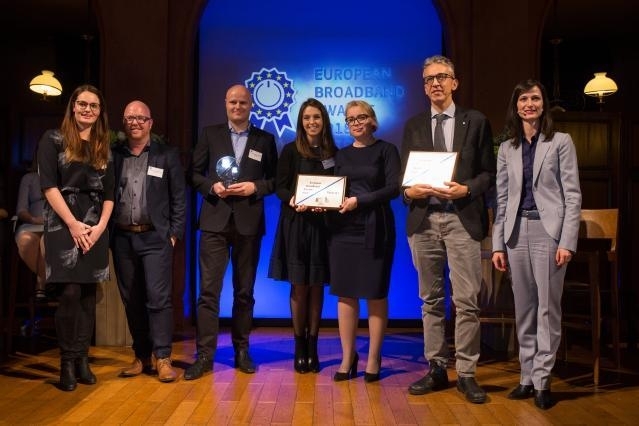The winners of the European Broadband Awards 2018 were honored at an awards ceremony in Brussels on 19 November. The European Commissioner for Digital Economy and Society Mariya Gabriel and the Commissioner for Regional Development Corina Creţu honored five projects. The winners were also given the opportunity to present their projects at the “Broadband Day: Mind the Broadband Gap” conference on November 20 in Brussels.
Following the success of previous years, projects from 16 EU countries applied for the European Broadband Awards 2018. The projects were evaluated by an independent jury of five broadband experts who selected the finalists and the five winners. All of these projects represent innovative and collaborative approaches and solutions for broadband deployment in Europe.
The winners at a glance
Category 1: Innovative financing, business and investment models
Michaelston-y-Fedw Internet Community Interest Company, Great Britain
This project is an excellent example of the installation of a gigabit upload and download FTTP network. With the seed capital provided by the municipality, a sustainable high-speed network has been built to serve all residents. The profits generated by the broadband services are reinvested in the expansion of services and infrastructure or in further projects at community level, which are determined by the shareholders of the joint venture.
Category 2: Cost reduction and investment participation in sustainable infrastructure
Sunne in the network of the future, Sweden
In this project in a Swedish municipality, the old copper network was replaced with fiber optic and mobile networks. Thanks to the successful cooperation between the municipality and telecommunications company Telia, all residents will have access to a modern communications infrastructure with download speeds of up to 1 Gbit/s by the end of the project in January 2019. In addition to the infrastructure, the municipality and Telia have launched the “More Digital” education initiative – a programme for senior citizens taking their first steps into digitalisation.
Category 3: Territorial cohesion in rural and peripheral areas
Poland is entering the gigabit society, Poland
This project covers the whole of Poland, but focuses in particular on remote areas that are not covered by broadband. The project offers new opportunities for work, communication, education and culture for citizens in these regions. Schools in these areas will also benefit from high-speed telecommunications services. It is an excellent example of the positive impact of EU funding on the economy and society.
Category 4: Socio-economic impact and financial viability
Broadband for Mandø – Connecting the UNESCO World Heritage Site “Wadden Sea”, Denmark
Thanks to the project, the inhabitants of the small island of Mandø will benefit from a high-speed broadband network. The island with only 110 houses is located in the Wadden Sea UNESCO World Heritage Site in Denmark. Together with the utility company SE/STOFA, the municipality managed to connect almost all houses on the island to the network. Tourism in particular has benefited greatly, as not only has the number of island guests increased, but they can also be offered better services (e.g. online booking systems). This is accompanied by increased economic activities (e.g. island tours) on Mandø.
Category 5: Openness and competition
Val d’Oise – Ultra-fast broadband project with the help of public initiatives: Debitex and Vortex, France
The French project is based on public funding and ensures that all residential buildings, businesses and public institutions in the Val d’Oise region have access to ultra-fast broadband services. Wholesale services are offered on a neutral basis by two “Public Initiative Networks” (PINs), Debitex and Vortex, which allow all Internet service providers to make their offers available. This will give residents in the rural areas of the Val d’Oise region access to ultra-fast affordable broadband. This contributes directly to eliminating the digital divide in the region.
Broadband for Europe
Most of the applications came from Denmark, Germany and Spain. The majority of projects applied in category 3 “Territorial cohesion in rural and peripheral areas”. The winners of the European Broadband Awards 2018 were honored at an awards ceremony in Brussels on the evening of November 19. Host Mariya Gabriel: “The projects we have honored are excellent examples of how technology brings European citizens closer together. Each of us should be part of our modern society. High-quality broadband connections are essential for all Europeans to reap their benefits.”
The following day, the “Broadband Day: Mind the Broadband Gap Conference” took place. There, the winners reported on their experiences and approaches. All conference participants had the opportunity to talk to the representatives of the projects and actively participate in the discussions on regulatory issues and financing options for broadband expansion in Europe.
All of this year’s projects can be found on the websites, in the newsletters and in the good practice database of the European Commission, DG CONNECT.
aconium GmbH implements this format and supports the European Commission and the applicants throughout the entire process.
Photo: Mariya Gabriel (European Commissioner for Digital Economy and Society, r.) and Magdalena Jähler (aconium, l.) with the winners of the European Broadband Awards 2018. Brussels, 19.11.2018.
Photo credit: European Commission

